Charles E W Bean, Diaries, AWM38 3DRL 606/260/1 - 1916 - 1930 - Part 1
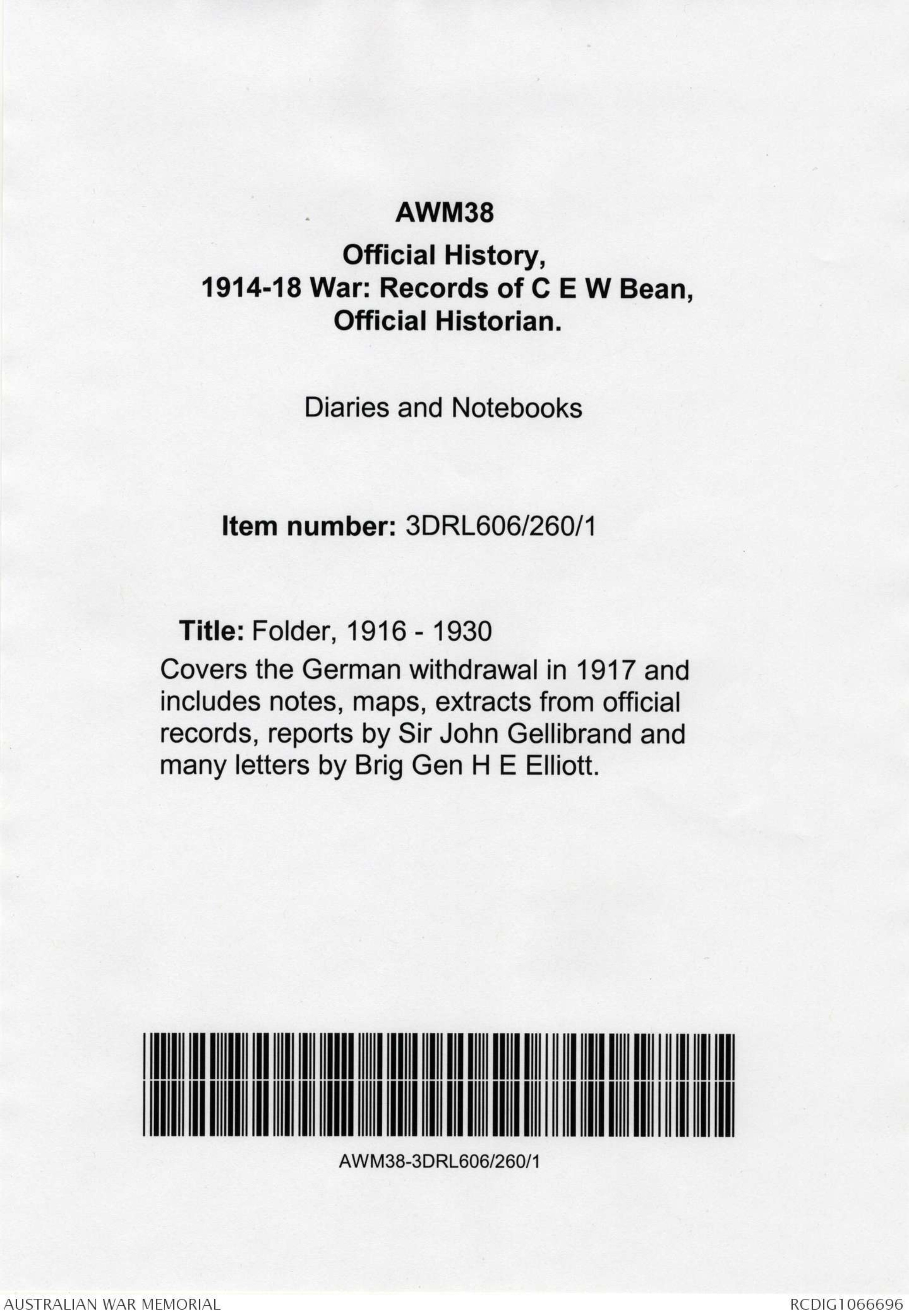
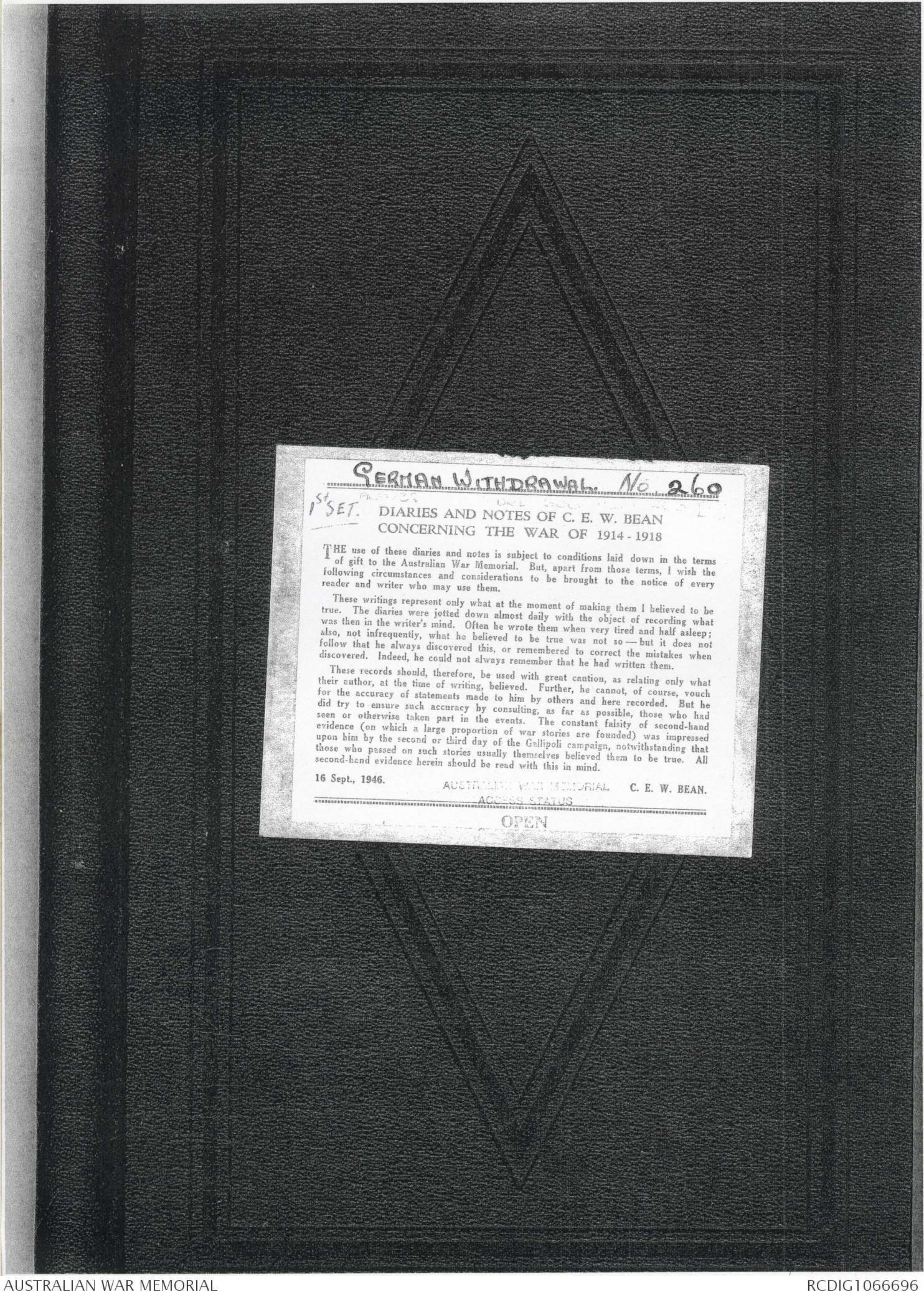
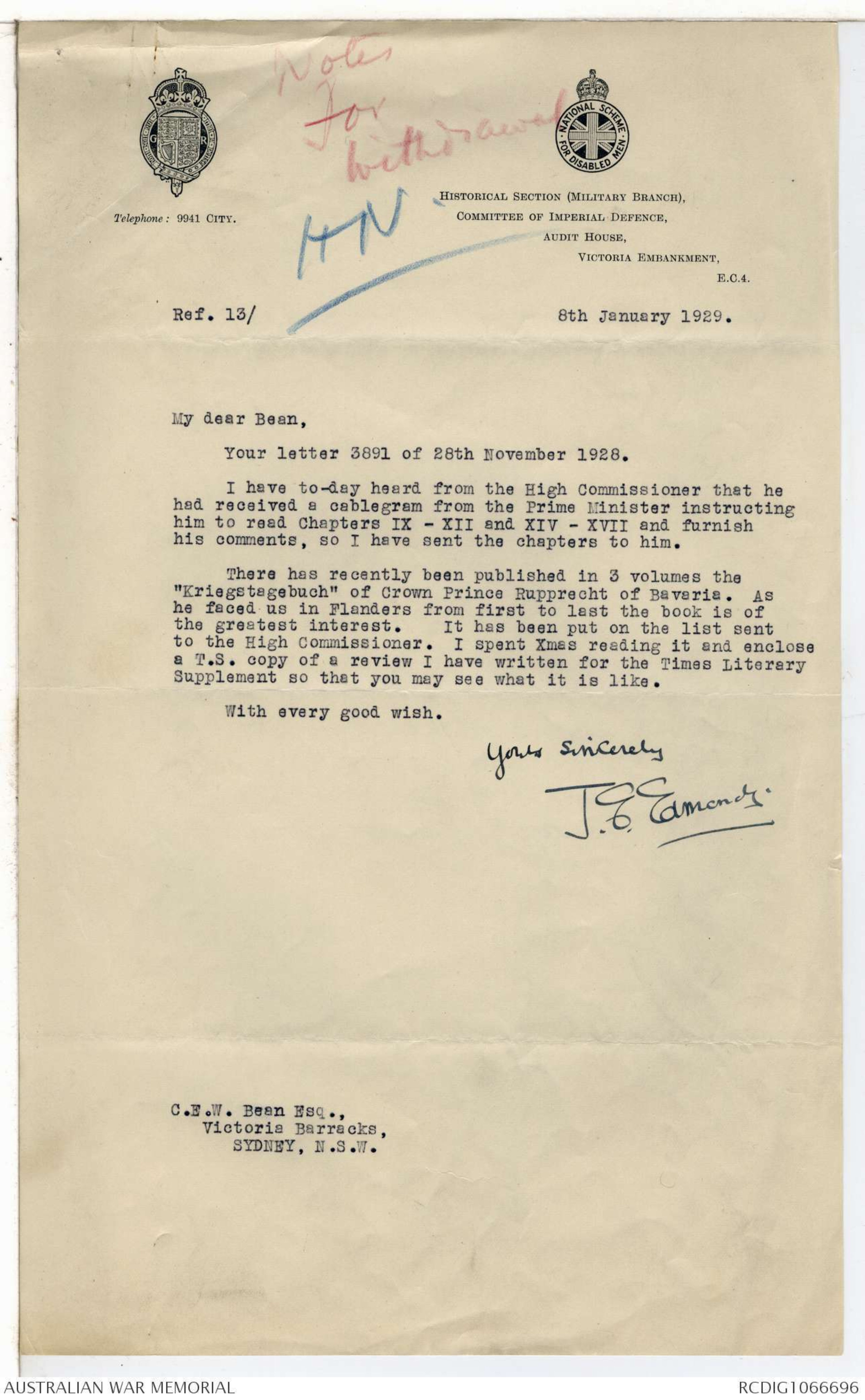
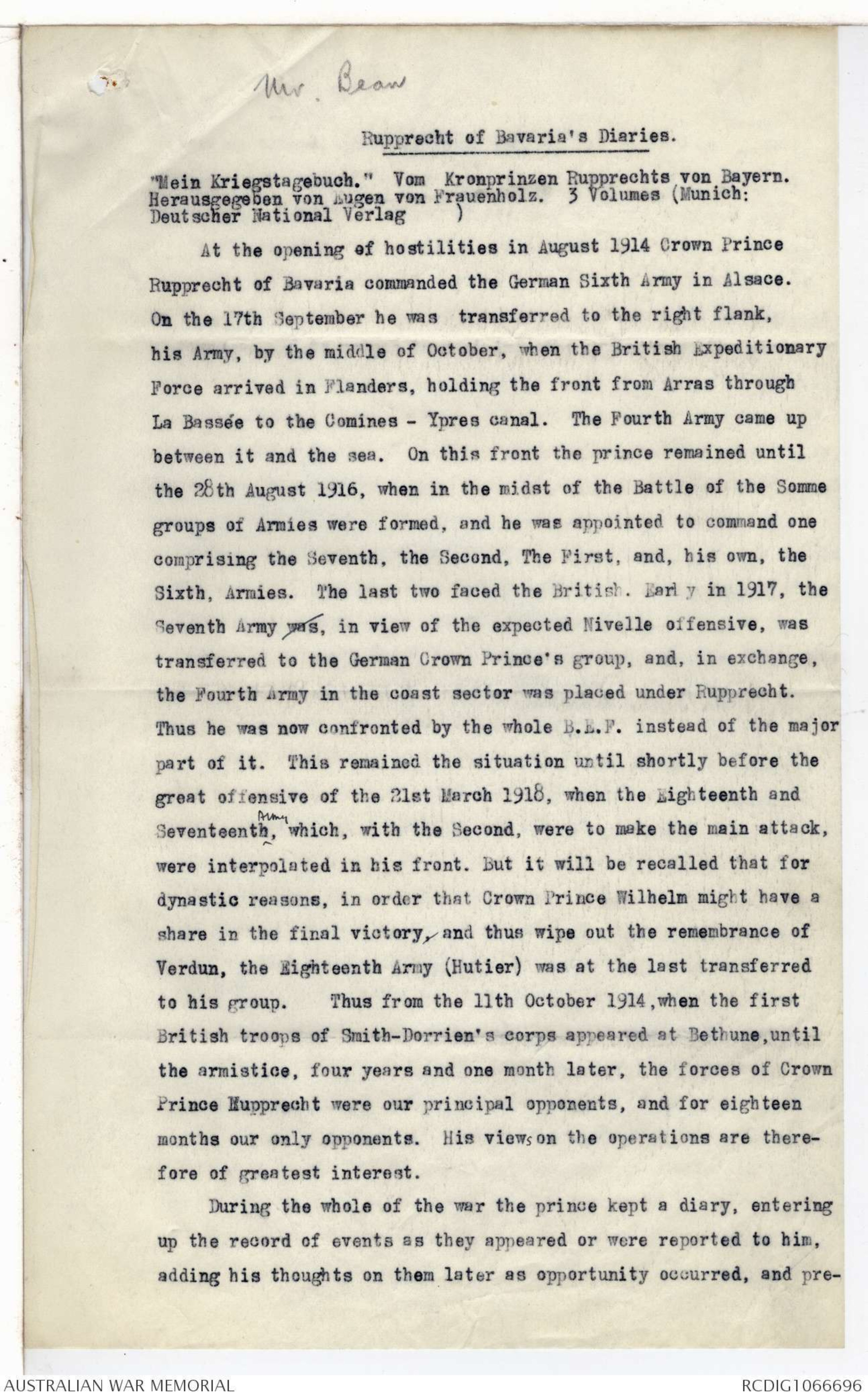
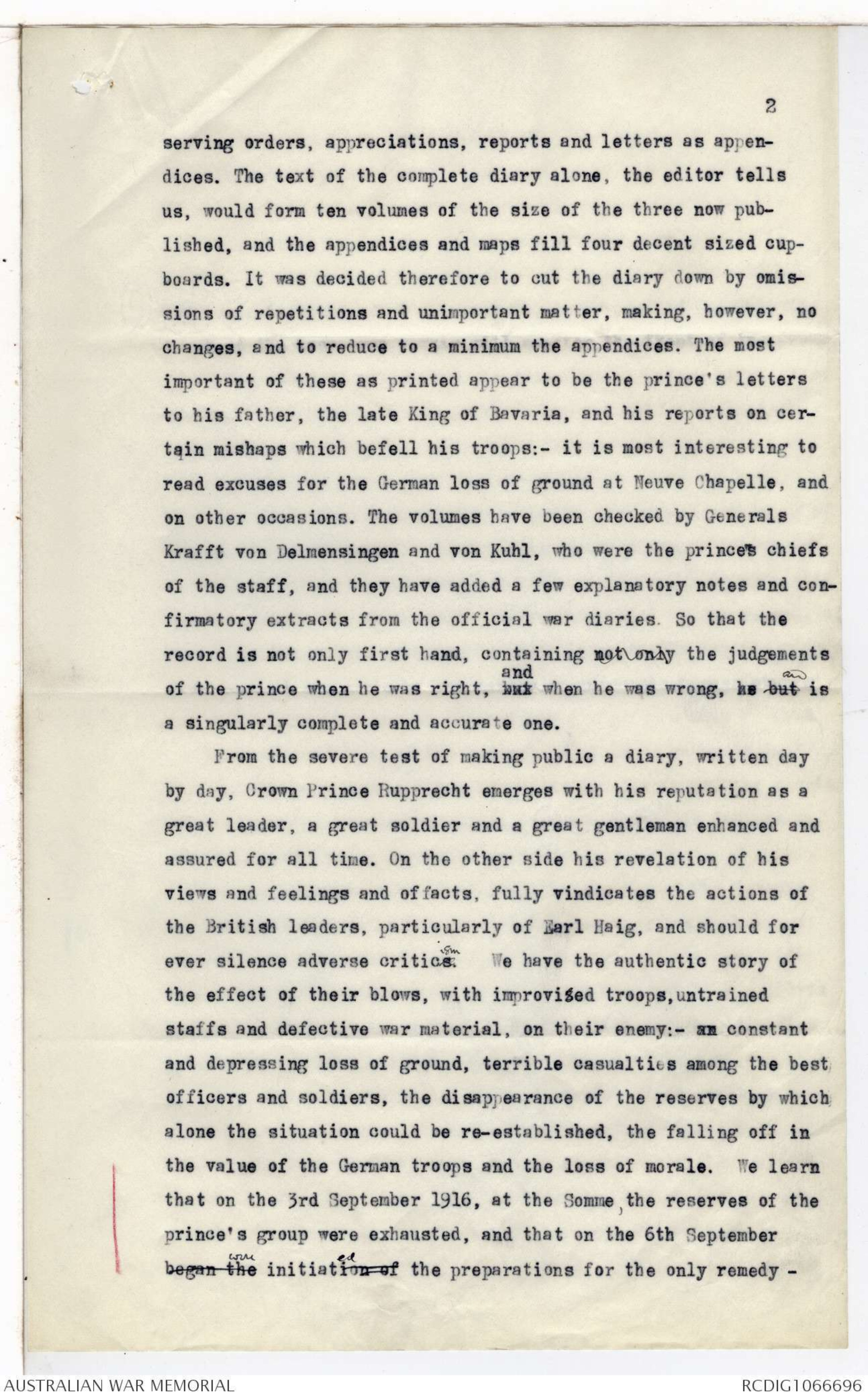
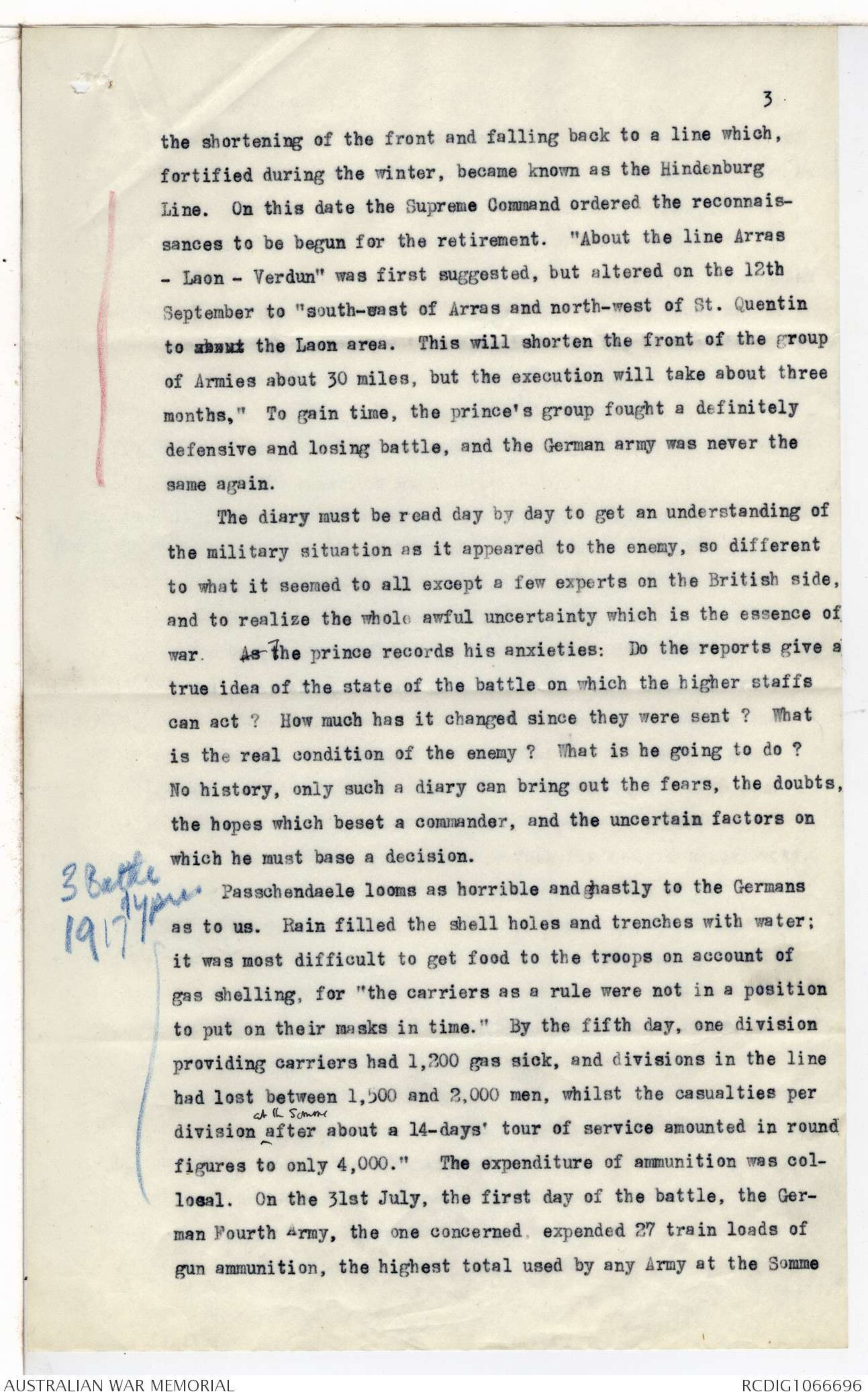
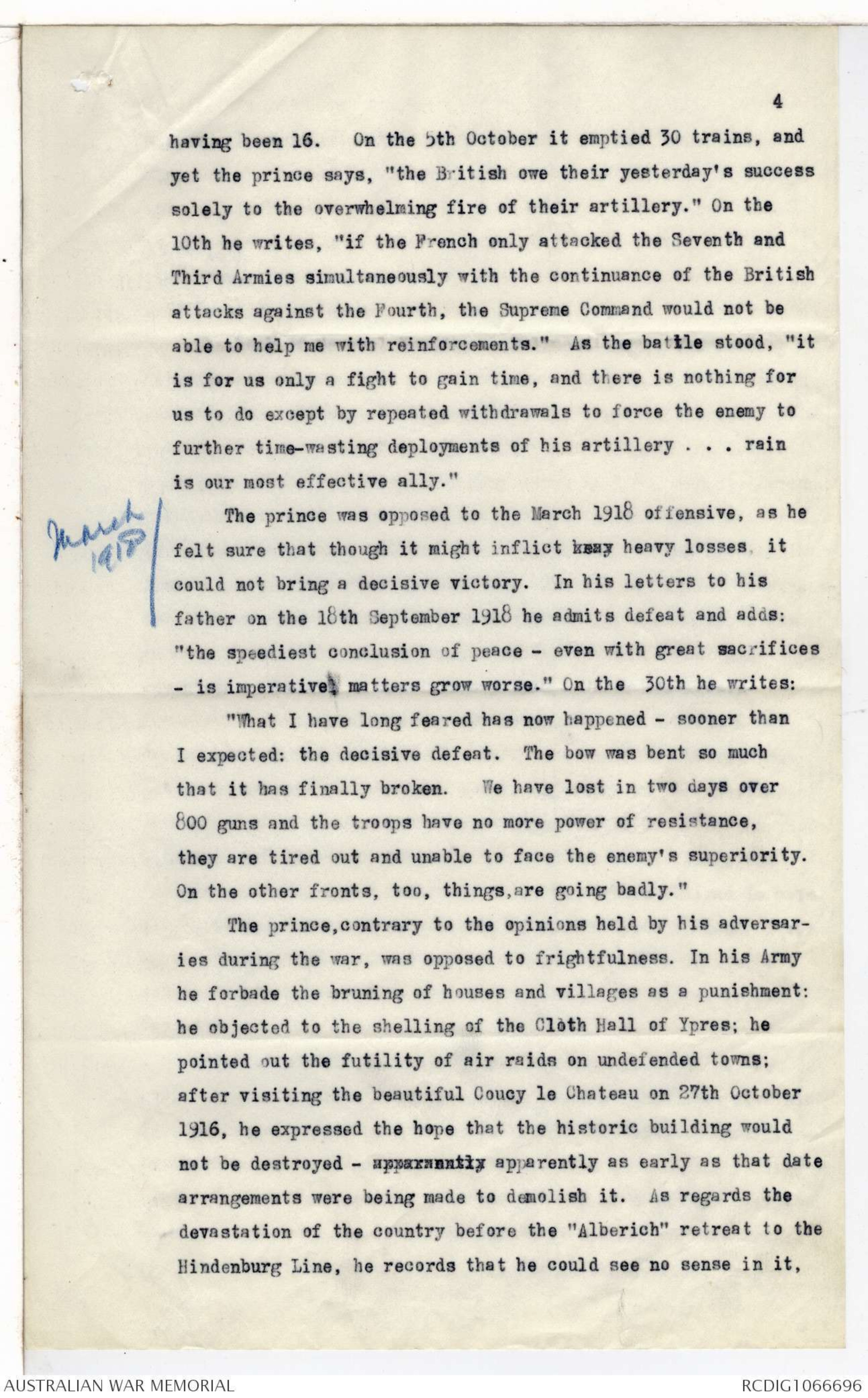
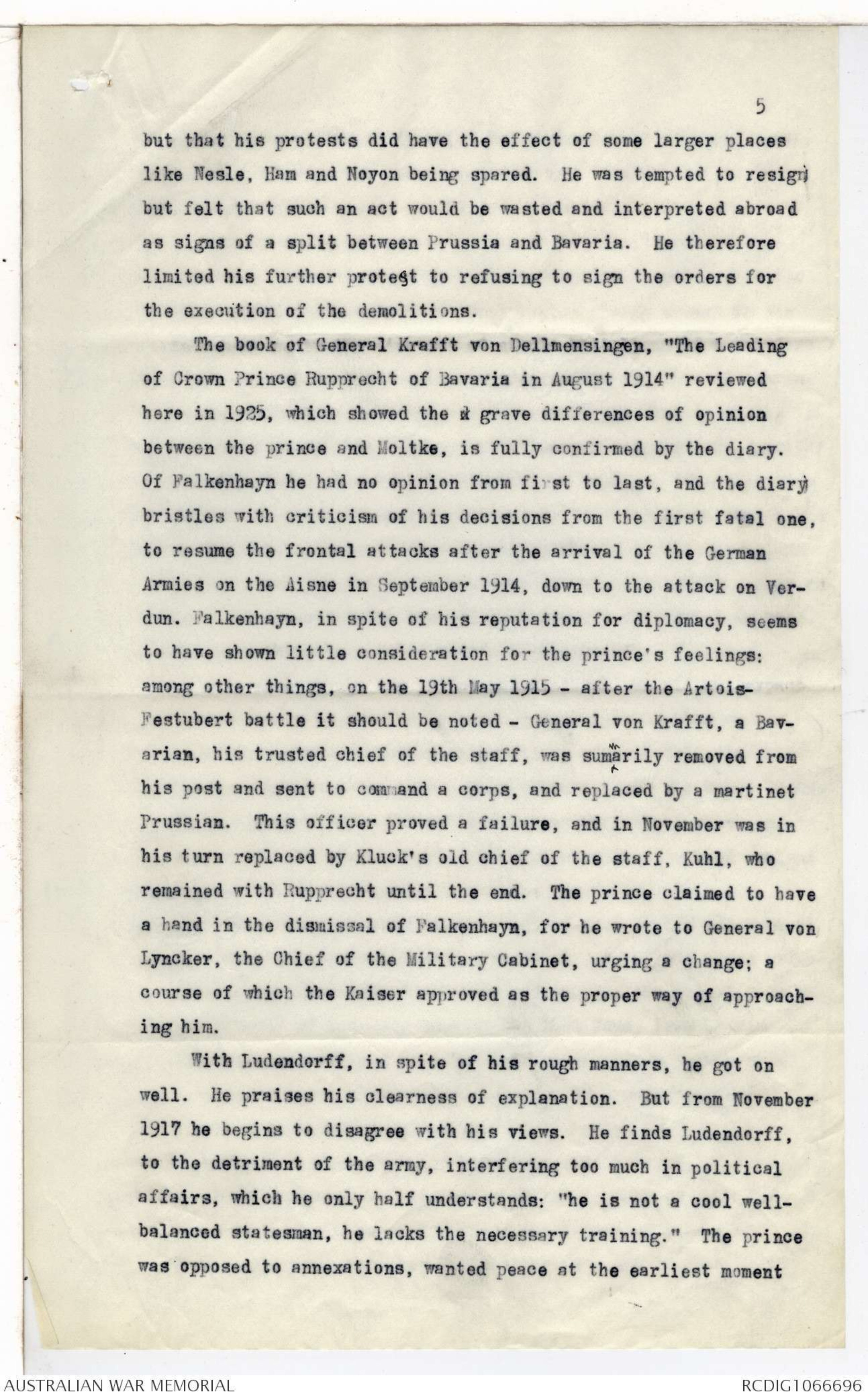
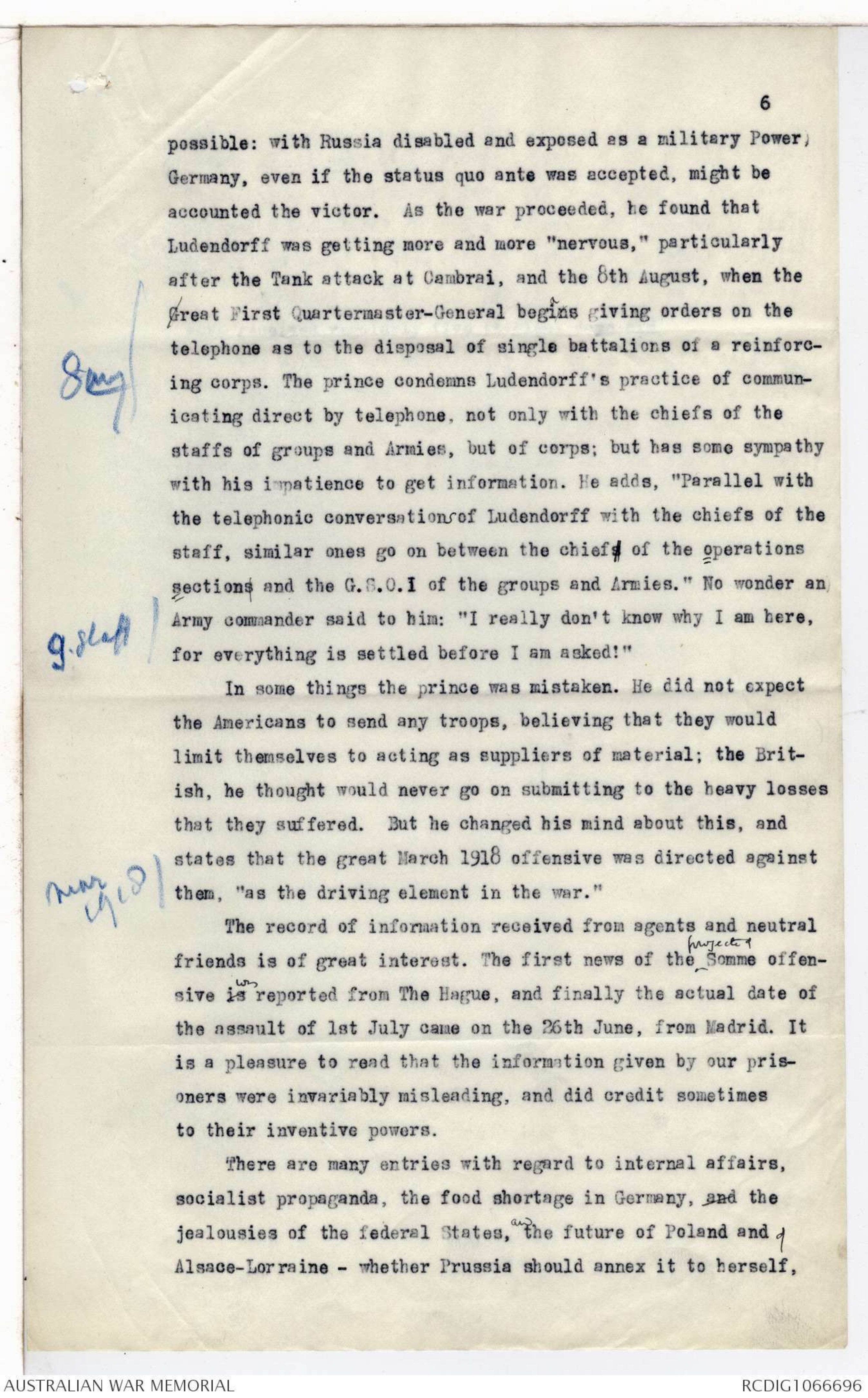
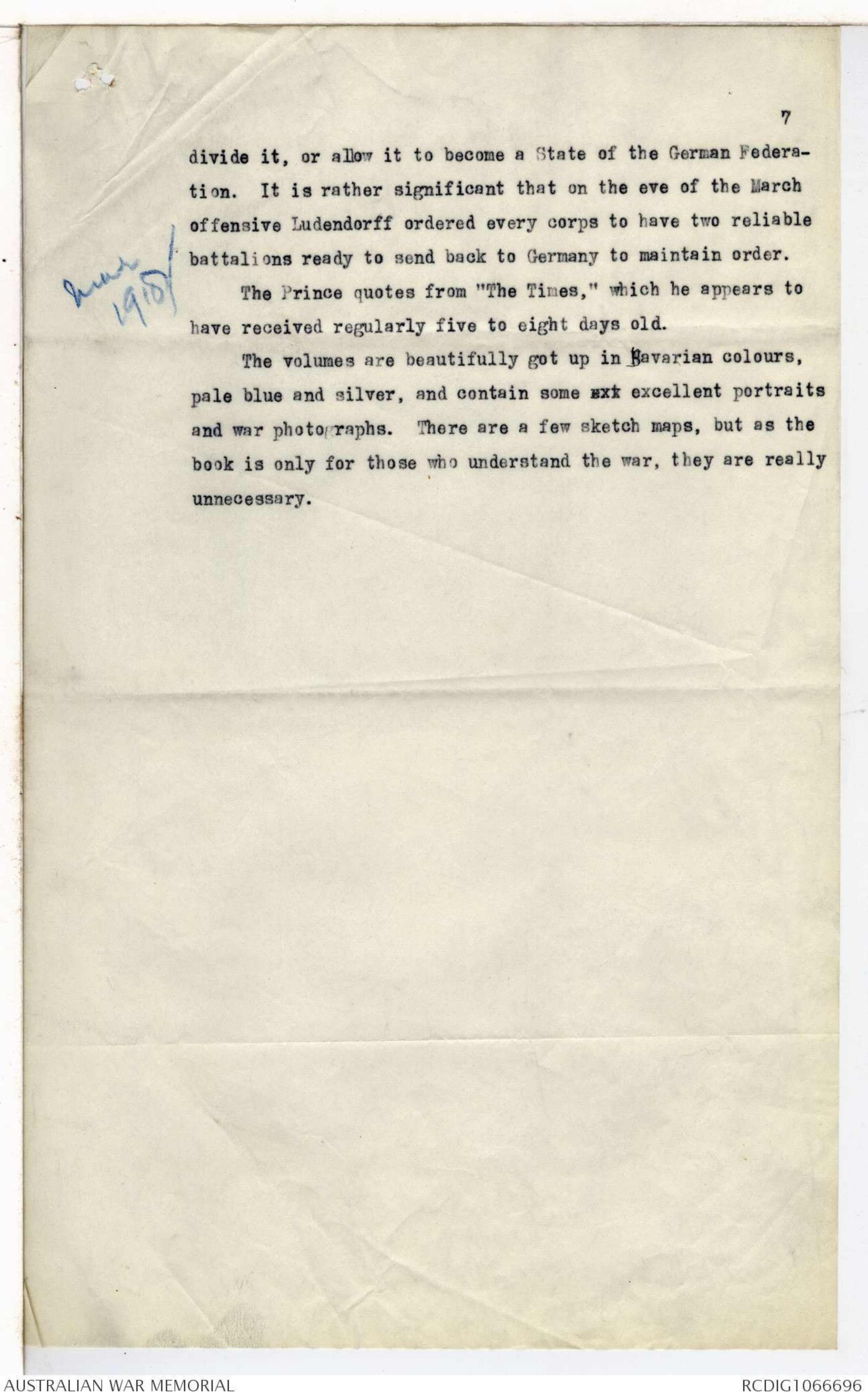
AWM38
Official History,
1914-18 War: Records of C E W Bean,
Official Historian.
Diaries and Notebooks
Item number: 3DRL606/260/1
Title: Folder, 1916 - 1930
Covers the German withdrawal in 1917 and
includes notes, maps, extracts from official
records, reports by Sir John Gellibrand and
many letters by Brig Gen H E Elliott.
AWM38-3DRL606/260/1
GERMAN WITHDRAWAL. No 260
1st SET.
DIARIES AND NOTES OF C. E. W. BEAN
CONCERNING THE WAR OF 1914 - 1918
The use of these diaries and notes is subject to conditions laid down in the terms
of gift to the Australian War Memorial. But, apart from those terms, I wish the
following circumstances and considerations to be brought to the notice of every
reader and writer who may use them.
These writing represent only what at the moment of making them I believed to be
true. The diaries were jotted down almost daily with the object of recording what
was then in the writer's mind. Often he wrote them when very tired and half asleep ;
also, not infrequently, what he believed to be true was not so - but it does not
follow that he always discovered this, or remembered to correct the mistakes when
discovered. Indeed, he could not always remember that he had written them.
These records should, therefore, be used with great caution, as relating only what
their author, at the time of writing, believed. Further, he cannot, of course, vouch
for the accuracy of statements made to him by others and here recorded. But he
did try to ensure such accuracy by consulting, as far as possible, those who had
seen or otherwise taken part in the events. The constant falsity of second-hand
evidence (on which a large proportion of war stories are founded) was impressed
upon him by the second or third day of the Gallipoli campaign, notwithstanding that
those who passed on such stories usually themselves believed them to be true. All
second-hand evidence herein should be read with this in mind.
16 Sept., 1946
C. E. W. BEAN
AUSTRALIAN WAR MEMORIAL
ACCESS STATUS
OPEN
NATIONAL SCHEME FOR DISABLED MEN
HISTORICAL SECTION (MILITARY BRANCH),
COMITTEE OF IMPERIAL DEFENCE,
AUDIT HOUSE,
VICTORIAN EMBANKMENT,
E.C.4
[*Notes for withdrawal*]
[*HN*]
Telephone : 9941 CITY.
Ref. 13/
8th January 1929.
My dear Bean,
Your letter 3891 of 28th November 1928.
I have to-day heard from the High Commissioner that he
had received a cablegram from the Prime Minister instructing
him to read Chapters IX - XII and XIV - XVII and furnish
is comments , so I have sent the chapters to him.
There has recently been published in 3 volumes the
"Kriegstagebuch" of Crown Prince Rupprecht of Bavaria. As
he faced up in Flanders from the first to last the book is of
the greatest interest. It has been put on the list sent
to the High Commissioner. I spent Xmas reading it and enclosed
a T.S. copy of a review I have written for the Times Literary
Supplement so that you may see what it is like.
With every good wish.
Yours sincerely
JE Edmonds.
C.E.W. Bean Esq.,
Victoria Barracks,
SYDNEY, N.S.W.
Mr. Bean.
Rupprecht of Bavaria's Diaries.
"Mein Kriegstagebuch." Vom Kronprinzen Rupprechts von Bayern.
Herausgegeben von Eugen von Frauenholz. 3 Volumes (Munich:
Deutscher National Verlag )
At the opening of hostilities in August 1914 Crown Prince
Rupprecht of Bavaria commanded the German Sixth Army in Alsace.
On the 17th September he was transferred to the right flank,
his Army, by the middle of October, when the British Expeditionary
Force arrived in Flanders, holding the front from Arras through
La Bassee to the Comines - Ypres canal. The Fourth Army came up
between it and the sea. On this front the prince remained until
the 28th August 1916, when in the midst of the Battle of the Somme
groups of Armies were formed, and he was appointed to command one
compromising the Seventh, the Second, The First, and, his own, the
Sixth, Armies. The last two faced the British. Early in 1917, the
Seventh Army was, in view of the expected Nivelle offensive, was
transferred to the German Crown Prince's group, and, in exchange,
the Fourth Army in the coast sector was placed under Rupprecht.
Thus he was now confronted by the whole B.E.F. instead of the major
part of it. This remained the situation until shortly before the
great offensive of the 21st March 1918, when the Eighteenth and
Seventeenth ^Army, which, with the Second, were to make the main attack,
were interpolated in his front. But it will be recalled that for
dynastic reasons, in order that Crown Prince Wilhelm might have a
share in the final victory, and thus wipe out the remembrance of
Verdun, the Eighteenth Army (Hutier) was at the last transferred
to his group. Thus from the 11th October 1914, when the first
British troops of Smith-Dorrien's corps appeared at Bethune, until
the armistice, four years and one month later, the forces of Crown
Prince Rupprecht were our principal opponents, and for eighteen
months our only opponents. His views on the operations are therefore
of greatest interest.
During the whole of the war the prince kept a diary, entering
up the record of events as they appeared or were reported to him,
adding his thoughts on them later as opportunity occurred, and preserving
2
orders, appreciations, reports and letter as appendices.
The text of the complete diary alone, the editor tells
us, would form ten volumes of the size of the three now published,
and the appendices and maps fill four decent sized cupboards.
It was decided therefore to cut the diary down by omissions
of repetitions and unimportant matter, making, however, no
changes, and to reduce to a minimum the appendices. The most
important of these as printed appear to be the prince's letters
to his father, the late King of Bavaria, and his reports on certain
mishaps which befell his troops:- it is most interesting to
read excuses for the German loss of ground at Neuve Chappell, and
on other occasions. The volumes have been checked by Generals
Krafft van Delmensingen and von Kuhl, who were the prince's chiefs
of the staff, and they have added a few explanatory notes and confirmatory
extracts from the official war diaries. So that the
record is not only first hand, containing not only the judgements
of the prince when he was right, xxx ^and when he was wrong, he but is
a singularly complete and accurate one.
From the severe test of making public a diary, written day
by day, Crown Prince Rupprecht emerges with his reputation as a
great leader, a great soldier and a great gentleman enhanced and
assured for all time. On the other side his revelation of his
views and feelings and of facts, fully vindicates the actions of
the British leaders, particularly of Earl Haig, and should for
ever silence adverse critics. We have the authentic story of
the effect of their blows, with improvised troops, untrained
staffs and defective war material, on their enemy:- xx constant
and depressing loss of ground, terrible casualties among the best
officers and soldiers, the disappearance of the reserves by which
alone the situation could be re-established, the falling off in
the value of the German troops and the loss of morale. We learn
that on the the 3rd September 1916, at the Somme the reserves of the
prince's group were exhausted, and that on the 6th September
began the initiation of the preparations for the only remedy -
3
the shortening of the front and falling back to a line which,
fortified during the winter, became known as the Hindenburg
Line. On this date the Supreme Command ordered the reconnaissances
to be begun for the retirement. "About the line Arras
- Leon - Verdun" was first suggested, but altered on the 12th
September to "south-weast of Arras and north-west of St. Quentin
to about the Laon area. This will shorten the front of the group
of Armies about 30 miles, but the execution will take about three
months," To gain time, the prince's group fought a definitely
defensive and losing battle, and the German army was never the
same again.
The diary must be read day by day to get an understanding of
the military situation as it appeared to the enemy, so different
to what it seemed to all except a few experts on the British side,
and to realize the whole awful uncertainty which is the essence of
war. As The prince records his anxieties: Do the reports give a
true idea of the state of the battle on which the higher staffs
can act ? How much has it changed since they were sent ? What
is the real condition of the enemy ? What is he going to do ?
No history, only such a diary can bring out the fears, the doubts,
the hopes which beset a commander, and the uncertain factors on
which he must base a decision.
Passchendaele looms as horrible and ghastly to the Germans
as to us. Rain filled the shell holes and trenches with water ;
it was most difficult to get food to the troops on account on
gas shelling, for "the carriers as a rule were not in a position
to put on their marks in time." By the fifth day, one division
providing carriers had 1,200 gas sick, and divisions in the line
had lost between 1,500 and 2,000 men, whilst the casualties per
division ^at the Somme after about a 14-days' tour of service amounted in round
figures to only 4,000." The expenditure of ammunition was collosal.
On the 31st July, the first day of the battle, the German
Fourth Army, the one concerned, expended 27 train loads of
gun ammunition, the highest total used by and Army at the Somme
[3 Battle Ypres 1917*]
4
having been 16. On the 5th October it emptied 30 trains, and
yet the prince says, "the British owe their yesterday's success
solely to the overwhelming fire of their artillery. "On the
10th he writes, "if the French only attacked the Seventh and
Third Armies simultaneously with the continuance of the British
attacks against the Fourth, the Supreme Command would not be
able to help me with reinforcements." As the battle stood, "it
is for us only a fight to gain time, and there is nothing for
us to do except by repeated withdrawals to force the enemy to
further time-wasting deployments of his artillery . . . rain
is our most effective ally."
[*March 1918*]
The prince was opposed to the March 1918 offensive as he
felt sure that though it might inflict xxxx heavy losses it
could not bring a decisive victory. In his letters to his
father on the 18th September 1918 he admits defeat and adds:
"the speediest conclusion of peace - even with great sacrifices
- is imperative: matters grow worse." On the 30th he writes:
"What I have long feared has now happened - sooner than
I expected: the decisive defeat. The bow was bent so much
that it has finally broken. We have lost in two days over
800 guns and the troops have no more power of resistance,
they are tired out and unable to face the enemy's superiority.
On the other fronts, too, things, are going badly."
The prince, contrary to the opinions held by his adversaries
during the war, was opposed to frightfulness. In his Army
he forbade the bruning of houses and villages as a punishment:
he objected to the shelling of the Cloth Hall of Ypres; he
pointed out the futility of air raids on undefended towns;
after visiting the beautiful Coucy Le Chateau on 27th October
1916, he expressed the hope that the historic building would
not be destroyed - xxxxxxxxx apparently as early as that date
arrangements were being made to demolish it. As regards the
devastation of the country before the "Alberich" retreat to the
Hindenburg Line, he records that he could see no sense in it,
5
but that his protests did have the effect of some larger places
like Nesle, Ham and Noyon being spared. He was tempted to resign
but felt that such an act would be wasted and interpreted abroad
as signs of a split between Prussia and Bavaria. He therefore
limited his further protecst to refusing to sign the orders for
the execution of the demolition.
The book of General Krafft von Dellmensingen, "The Leading
of Crown Prince Rupprecht of Bavaria in August 1914" reviewed
here in 1925, which showed the x grave difference of opinion
between the prince and Moltke, is fully confirmed by the diary.
Of Falkenhayn he had no opinion from the first to last, and the diary
bristles with criticism of his decisions from the first fatal one,
to resume the frontal attacks after the arrival of the German
Armies on the Aisne in September 1914, down to the attack on Verdun.
Falkenhayn, in spite of his reputation for diplomacy, seems
to have shown little consideration for the prince's feelings:
among other things, on the 19th May General von Krafft, a Bavarian,
his trusted chief of the staff, was sum^marily removed from
his post and sent to command a corps, and replaced by a martinet
Prussian. This officer proved a failure, and in November was in
his turn replaced by Kluck's old chief of the staff, Kuhl, who
remained with Rupprecht until the end. The prince claimed to have
a hand in the dismissal of Falkenhayn, for he wrote to General von
Lyncker, the Chief of the Military Cabinet, urging a change; a
course of which the Kaiser approved as the proper way of approaching
him.
With Ludendorff, in spite of his rough manners, he got on
well. He praises his clearness of explanation. But from November
1917 he begins to disagree with his views. He finds Ludendorff,
to the detriment of the army, interfering too much in political
affairs, which he only half understands: "he is not a cool well-balanced
statesman, he lacks the necessary training." The prince
was opposed to annexations, wanted peace at the earliest moment
6
possible: with Russia disabled and exposed as a military Power
Germany, even if the status quo ante was accepted, might be
accounted the victor. As the war proceeded, he found that
Ludendorff was getting more and more "nervous," particularly
after the Tank attack at Cambrai, and the 8th August, when the
Great First Quartermaster-General begins giving orders on the
telephone as to the disposal of single battalions of a reinforcing
[*8 May*]
corps. The prince condemns Ludendorff's practice of communicating
direct by telephone, not only with the chiefs of the
staffs of groups and Armies, but of corps; but has some sympathy
with his impatience to get information. He adds, "Parallel with
the telephonic conversations of Ludendorff with the chiefs of the
staff, similar ones go on between the chiefs of the operations
sections and the G.S.O.I of the groups and Armies. "No wonder an
Army commander said to him: "I really don't know why I am here,
[*g staff*]
for everything is settled before I am asked!"
In some things the prince was mistaken. He did not expect
the Americans to send any troops, believing that they would
limit themselves to acting as suppliers of material; the British,
he thought would never go on submitting to the heavy losses
that they suffered. But he changed his mind about this, and
states that the great March 1918 offensive was directed against
them, "as the driving element in the war."
[*Mar 1918*]
The record of information received from agents and neutral
friends is of great interest. The first news of the Somme offensive
is reported from the The Hague, and finally the actual date of
the assault of 1st July came on the 26th June, from Madrid. It
is a pleasure to read that the information given by our prisoners
were invariably misleading, and did credit sometimes
to their inventive powers.
There are many entries with regard to internal affairs,
socialist propaganda, the food shortage in Germany and the
jealousies of the federal States, the future of Poland and
Alsace-Lorraine - whether Prussia should annex it to herself,
7
divide it, or allow it to become a State of the German Federation.
It is rather significant that on the eve of the March
offensive Ludendorff ordered every corps to have two reliable
battalions ready to send back to Germany to maintain order.
[*March 1918*]
The Prince quotes from "The Times," which he appears to
have received regularly five to eight days old.
The volumes are beautifully got up in Havarian colours,
pale blue and silver, and contain some xxx excellent portraits
and war photographs. There are a few sketch maps, but as the
book is only for those who understand the war, they are really
unnecessary.
[[*??]]
 Sam scott
Sam scottThis transcription item is now locked to you for editing. To release the lock either Save your changes or Cancel.
This lock will be automatically released after 60 minutes of inactivity.